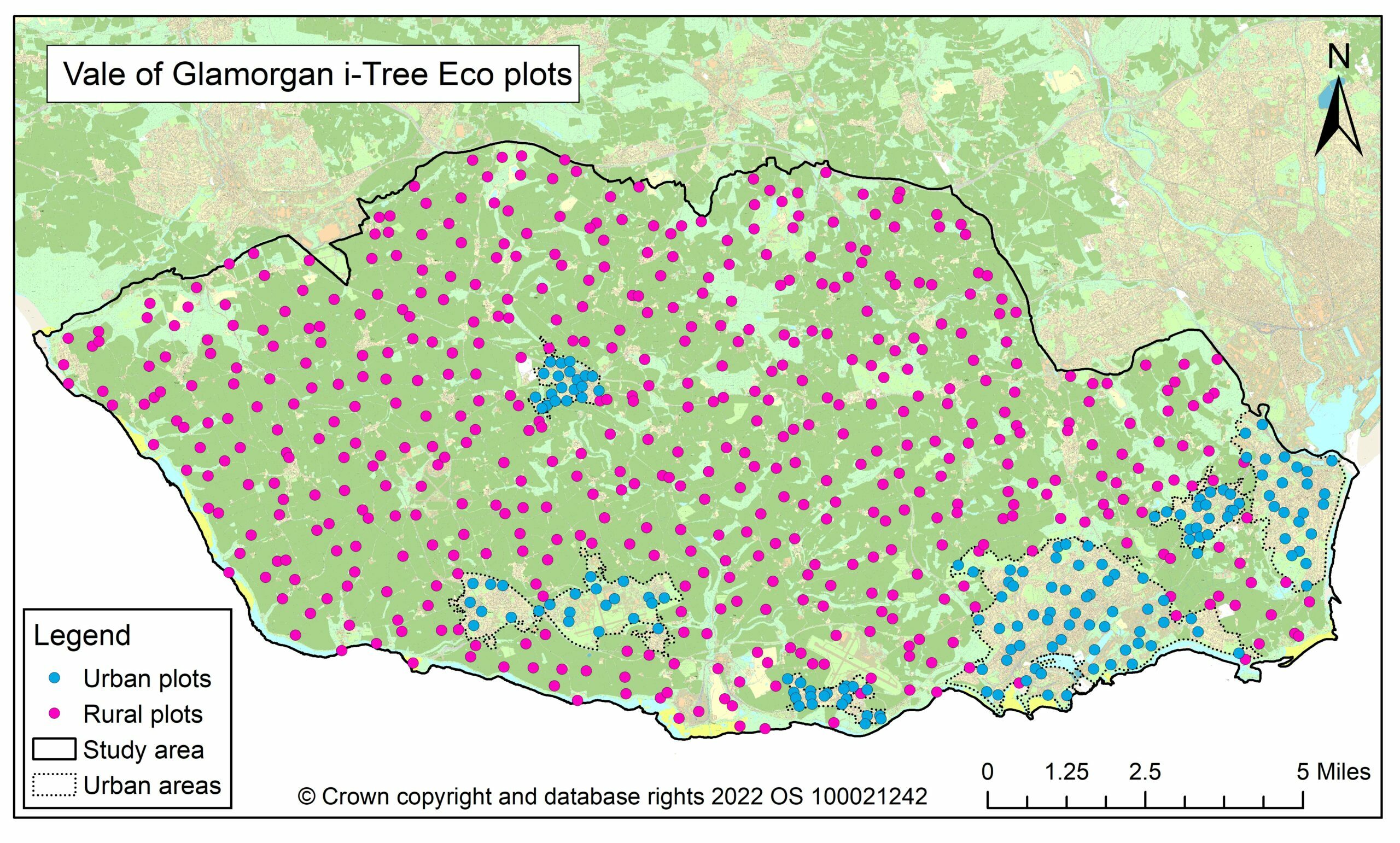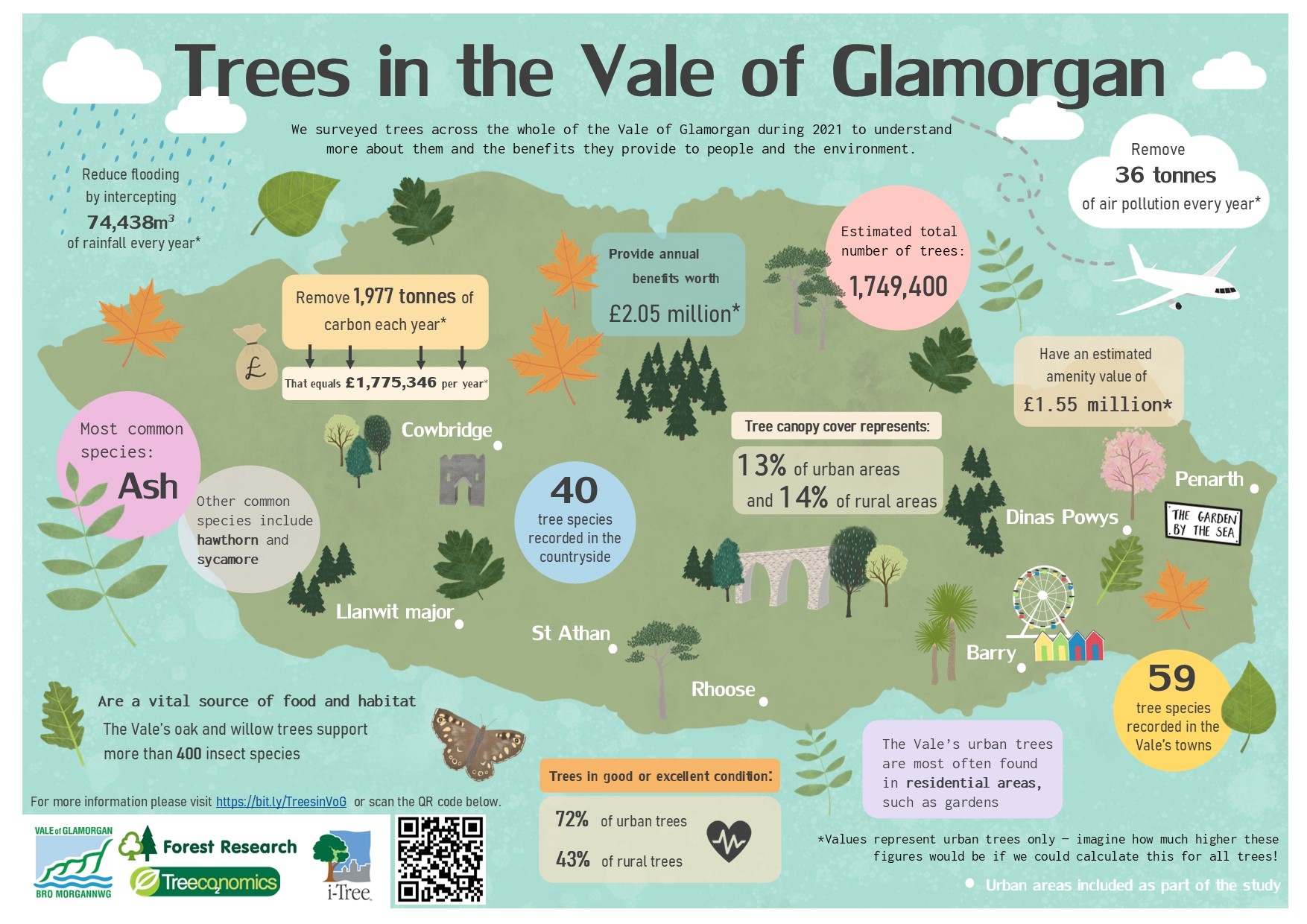Summary
Forest Research worked with Treeconomics and Vale of Glamorgan Council to undertake an i-Tree Eco survey in The Vale in summer 2021.
The Vale of Glamorgan study area covers 34,000 hectares and includes six urban centres covering 3,600 hectares (Llantwit Major and St Athan, Cowbridge, Barry, Rhoose, Penarth, Murch). To enable comparison of the structure of the urban forest between the urban and rural areas 164 plots were distributed across the urban areas, and 517 in the rural surroundings.

We used i-Tree Eco to analyse the survey data to assess the composition and structure of The Vale’s urban forest, including species diversity, risks from pests and diseases, and the range of tree ages in the region. i-Tree Eco enables us to calculate the ecosystem services provided by The Vale’s trees.
In addition we have undertaken a CAVAT analysis of the Vale of Glamorgan’s trees, to calculate the value of the amenity the trees provide to people in the region.
Research Objectives
This project aimed to:
- Gain a current, baseline understanding of the extent, composition, and condition of the Vale of Glamorgan’s tree resource in rural and urban areas
- Value some of the ecosystem services that the Vale of Glamorgan’s urban trees can provide
- Inform target-setting for increasing tree canopy cover, and the development of a tree strategy that considers the effective management and enhancement of the Vale of Glamorgan’s trees
- Increase the awareness of the importance of trees in the Vale of Glamorgan and the benefits they can provide
Findings and Recommendations
Findings
There are an estimated 1.7 million trees in the Vale of Glamorgan, containing 59 different species. Urban trees in the Vale provide benefits worth £2.05 million per year. This value represents carbon sequestration, air pollution removal, and avoided surface water runoff.
There is an over-reliance on ash (Fraxinus excelsior) in both the urban and rural tree populations. In light of ash dieback (Hymenoscyphus fraxineus) this presents a threat to the overall resilience and sustainability of the Vale of Glamorgan’s tree resource and the benefits it provides.
Much of the Vale of Glamorgan’s urban forest is privately owned, with over half of all trees surveyed located on residential property. Strategic tree management should consider prioritising engagement with the local community to enhance and protect existing tree cover.
There is little difference in tree canopy cover between rural (14%) and urban areas (13%), both of which are below the reported averages for Wales and below recommended canopy cover targets.
The Vale of Glamorgan’s rural area is dominated by agricultural land, comprising over four fifths of all plots surveyed. This presents potential opportunities to increase canopy cover and ecological connectivity through further woodland planting and agroforestry.

Recommendations
For both rural and urban areas, set realistic and attainable canopy cover targets, taking into account the current tree cover and planting opportunities, and engage a wide range of stakeholders to help to increase overall tree cover.
Undertake tree planting to increase and maintain canopy cover where losses occur, and protect the existing tree resource. Identify priority planting areas where provision of benefits is currently low.
Build on the current understanding of the Vale’s tree population through monitoring, surveys, and collating data such as tree inventories. Raise public awareness of the value and importance of trees by creating opportunities for community engagement, using resources such as Treezilla.
Ensure that trees are viewed as an integral component of landscape character by creating quality greenspaces using considered and distinctive planting schemes. Incorporate tree establishment targets, rather than tree planting targets, into planning policy and guidance documents, to protect existing trees and help to ensure the longevity of newly-planted trees in new developments.

Latest Update
Surveying of over 600 plots was completed in 2022. Data processing and analysis is complete, and the final reports are available to download on this page.
Downloads

Vale of Glamorgan Infographic
Graphical summary of results from the Vale of Glamorgan study

Vale of Glamorgan i-Tree Eco summary report
Vale of Glamorgan i-Tree Eco summary report

Vale of Glamorgan i-Tree Eco Technical Report
Vale of Glamorgan i-Tree Eco Technical Report
Funding & Partners
-
 Vale of Glamorgan Council
Vale of Glamorgan Council -
 Treeconomics
Treeconomics -
 Forest Research
Forest Research
